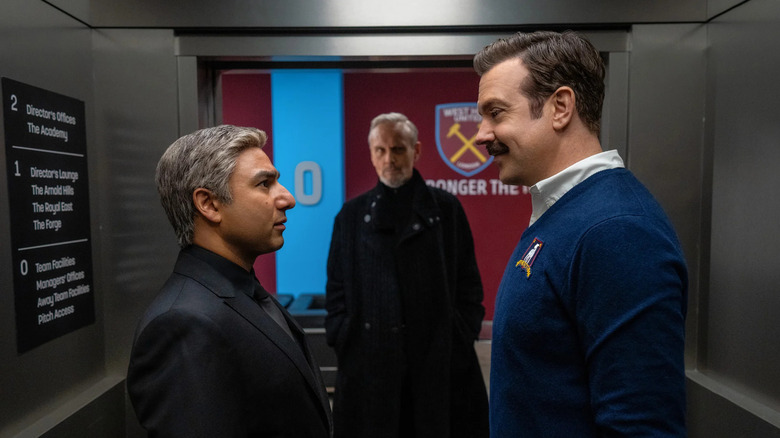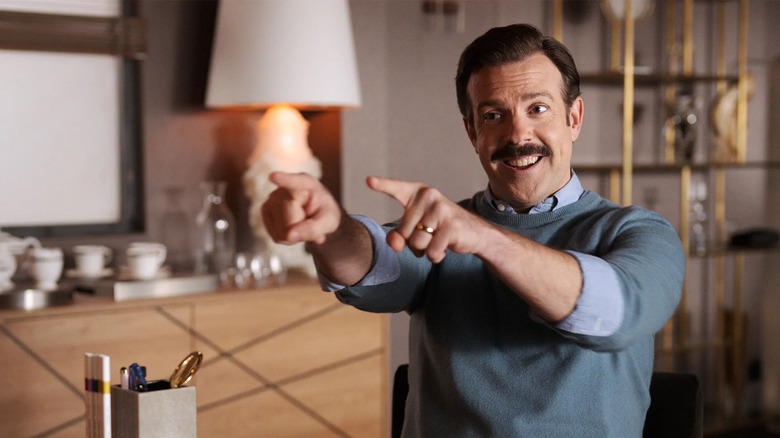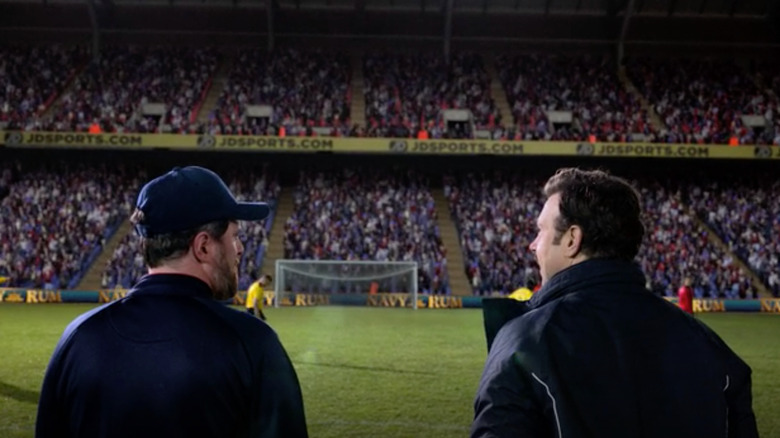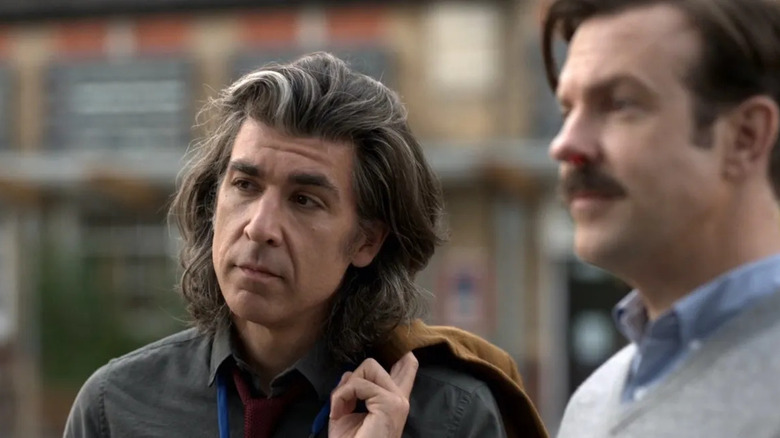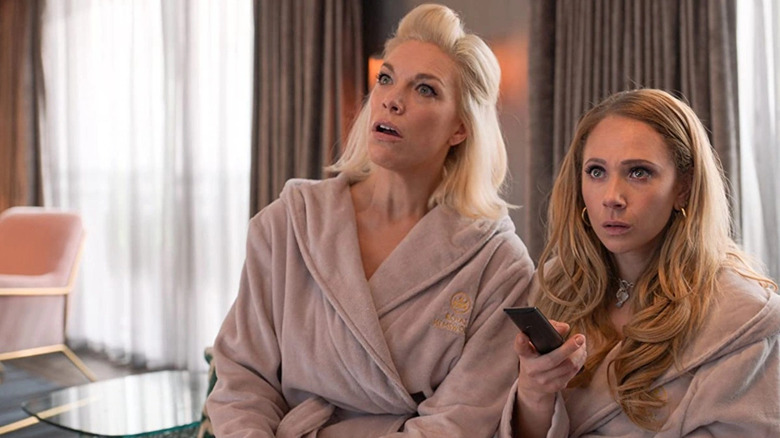Why Ted Lasso Ended With Season 3
When the "Ted Lasso" promo arrived to plug NBC Sport's coverage of the English Premier League back in 2013, who could have predicted that it would provide the basis for a multi-Emmy-winning TV show? Starring Jason Sudeikis as the ultra-driven new coach of the "Tottenham Hot Spurs," it was a one-joke premise that played on the notion that Americans don't know the first thing about football ... or soccer, as they like to call it. But it was one joke so neatly done that it was a wonder that no one had really done it before. At least not three seasons worth, anyway.
By the time the first season of "Ted Lasso" aired in 2020, the character had become less belligerent and more kind, a development that contributed to the show's massive success. The timing was also fortuitous. While it's impossible to say whether it would have been such a hit under normal circumstances, the show became compulsive comfort viewing during the pandemic, promoting kindness and positive change when we were going through a very abnormal situation and millions were taking stock of their own lives. Ted felt like the right man for his time and place, an antidote to the gloom and cynicism of the modern world.
The popularity of "Ted Lasso" was mirrored by the many accolades it received. It racked up the most nominations for a first-season comedy in the Primetime Emmy Awards' history, with 20 nods and taking home 7 awards. Sudeikis also picked up two Golden Globes for his performance in the first two seasons.
"Believe" was a key message of the show and, even after season 3 brought all the major storylines to a close, fans are still trying to believe another season or a spinoff into existence. But why did the show conclude when it did, and what does the future hold?
Ted Lasso gave itself a lot to wrap up in season 3
The breezy first two seasons of "Ted Lasso" did a great job of introducing the clueless coach, setting up his sporting fairytale, and establishing the show's core values. For those who missed it, Ted (Jason Sudeikis) is a relentlessly optimistic American college football coach controversially hired by Rebecca Welton (Hannah Waddington) to take over at AFC Richmond, a fictional London soccer team. Unknown to Ted, she has only picked him to ensure the demise of her ex-husband's beloved club.
Accompanied by his taciturn best friend and assistant Coach Beard (Brendan Hunt), it's not long before Ted wins over his boss and his many detractors with his infectious good cheer and positive vibes. But there is also a deep sadness lurking behind Ted's sunny attitude; he took the job to put an ocean's worth of space between him and his wife, who wants a divorce.
The show charts the fall and rise of Lasso's hapless team, relegated from the Premier League in the first season and bouncing back to the big time in the second. Along the way, we got several other major characters with their own paths to discover, such as the transition of Jamie Tartt (Phil Dunster) from an egotistical prima donna to a genuine team player and the gruff self-loathing of Roy Kent (Brett Goldstein) as he comes to terms with the end of his playing career. The most interesting thread was the evolution of Nathan Shelley (Nick Mohammed) from a meek kit man to Ted's rival manager across town at West Ham United.
The show's writers kept piling their plate high with further character arcs and storylines in season 3, giving themselves plenty to do in order to wrap everything up by the finale. Especially since "Ted Lasso" was only envisaged as a three-parter in the first place.
The Ted Lasso creators always envisioned a three-season show
Jason Sudeikis and showrunner Bill Lawrence have always been open about how "Ted Lasso" was conceived and pitched as a three-season show, but that doesn't stop interviewers from continually asking about it. A few weeks before the final episode of season 3 aired in May this year, Sudeikis told Deadline:
"This is the end of this story that we wanted to tell, that we were hoping to tell, that we loved to tell. The fact that folks will want more and are curious beyond more than what they don't even know yet—that being Season 3—it's flattering. Maybe by May 31, once all 12 episodes of the season [have been released], they're like, 'Man, you know what, we get it, we're fine. We don't need anymore, we got it.' But until that time comes, I will appreciate the curiosity beyond what we've come up with so far."
As overstuffed as the third season is, it just about manages to get Ted's journey over the line in a satisfactory manner before the curtain comes down. Although the show's creators always envisaged it as a three-season arc, it might have been better if they worked out another season in order to give themselves and their many storylines a bit of breathing room. It certainly would have made season 3 more fun to watch; while the first two seasons were easily binge-able, the twelve episodes of season 3 were bloated to an hour or more. With so many characters and narrative threads to resolve, "Ted Lasso" began to feel simultaneously overlong and rushed. For me, watching the show started becoming a chore, and I only stuck with it because of that promised finishing line.
Was three seasons enough for Ted Lasso?
Ultimately, "Ted Lasso" ended when it should have. The main arc of Ted's journey took him to the right place, deciding it was time to return to the United States to be with his kid and start working on his relationship with his estranged wife. AFC Richmond's unlikely title challenge also ended in a fitting way. While it isn't impossible for a team of the club's stature to win the Premier League (as Leicester City proved in 2016) Ted repeatedly stated that winning or losing wasn't his main goal.
Some, but not all, supporting characters got satisfactory closure. Colin (Billy Harris) was finally able to celebrate with his boyfriend after coming out to the team and Sam (Toheeb Jimoh) got his dream call-up for the Nigerian international squad. Others felt a little shoehorned in there, such as Jamie reconciling with his wrong 'un father and Rebecca bumping into her handsome Dutch fling.
Ending when it did also prevented "Ted Lasso" from outstaying its welcome. While the show should be commended for promoting a positive view of life in a world often tarnished by relentless cynicism, its niceness eventually became a flaw, stripping it of any substantial conflict and delivering predictable happy endings. With all the heart-to-hearts, bonding, pep talks, and inspirational speeches, the show took on a sanctimonious quality that began to get a little irritating in season 3.
Despite "Ted Lasso" wrapping up where and when it needed to, it didn't take long for Apple TV+ to tease the possibility of more Lasso-related content. Less than a week after the final episode aired, the streaming platform tweeted a photo of Roy Kent, Coach Beard, and Nathan, along with the words "Smells like potential." So what of a possible season 4 or spinoff series?
What would a Ted Lasso spin-off look like?
Many words have already been written speculating which direction a "Ted Lasso" spin-off could take, but only two make any real sense. The first would be a continuation of AFC Richmond's fortunes, following them on their adventures in the UEFA Champions League. We got a little taster of European action in the Amsterdam episode in season 3, and it would be fun watching the team enjoy the delights of Barcelona, Prague, Istanbul, or further flung locations under Roy Kent's new management.
A more intriguing prospect would be a follow-up series based on Keeley's proposal for a Richmond women's team, teased in the final moments of the last episode. Perhaps Keeley could even coach the team herself; with her wide-eyed exuberance, she would be the show's natural successor to Ted, and she certainly can't know any less about soccer than he did when taking the job at the club.
Focusing on the women's game would be timely. It has come on dramatically in recent years, especially in England after the rip-roaring success of Sarina Wiegman's national team at the Euros last year. They're packing out Wembley Stadium for friendlies these days, and the upcoming World Cup in Australia and New Zealand is predicted to break record attendance figures once again.
Using the success of "Ted Lasso" would only serve to increase the profile and popularity of women's soccer, and also give Keeley and Rebecca more to do after they were often left on the sidelines in season 3. Plus the writers could bring back a prominent minor character who disappeared from view among all the other stories: "Soccer Girl" (Shannon Hayes), the talented teen Ted spots running circles around the lads in earlier episodes. With its immense popularity, I have a sneaking suspicion that "Ted Lasso" could still head to extra time yet.
